Analyzing the Economic Impact of Brexit on the UK Economy
VerifiedAdded on 2022/08/14
|8
|606
|17
Report
AI Summary
This report examines the multifaceted economic impact of Brexit on the United Kingdom. It begins with a background on the European Union and the 2016 referendum, providing context for the UK's decision to leave. The rationale for the study is the uncertainty surrounding Brexit's consequences, prompting an analysis to measure its effects. The report aims to analyze available data sources, providing results for stakeholders, and its objectives include understanding Brexit's overall economic impact, identifying affected sectors, and determining their future prospects. The methodology relies on secondary data from government sources, with some primary data, and a Gantt chart outlines the project's timeline. The report references relevant sources to support its findings, aiming to offer a clear picture of Brexit's economic impact.
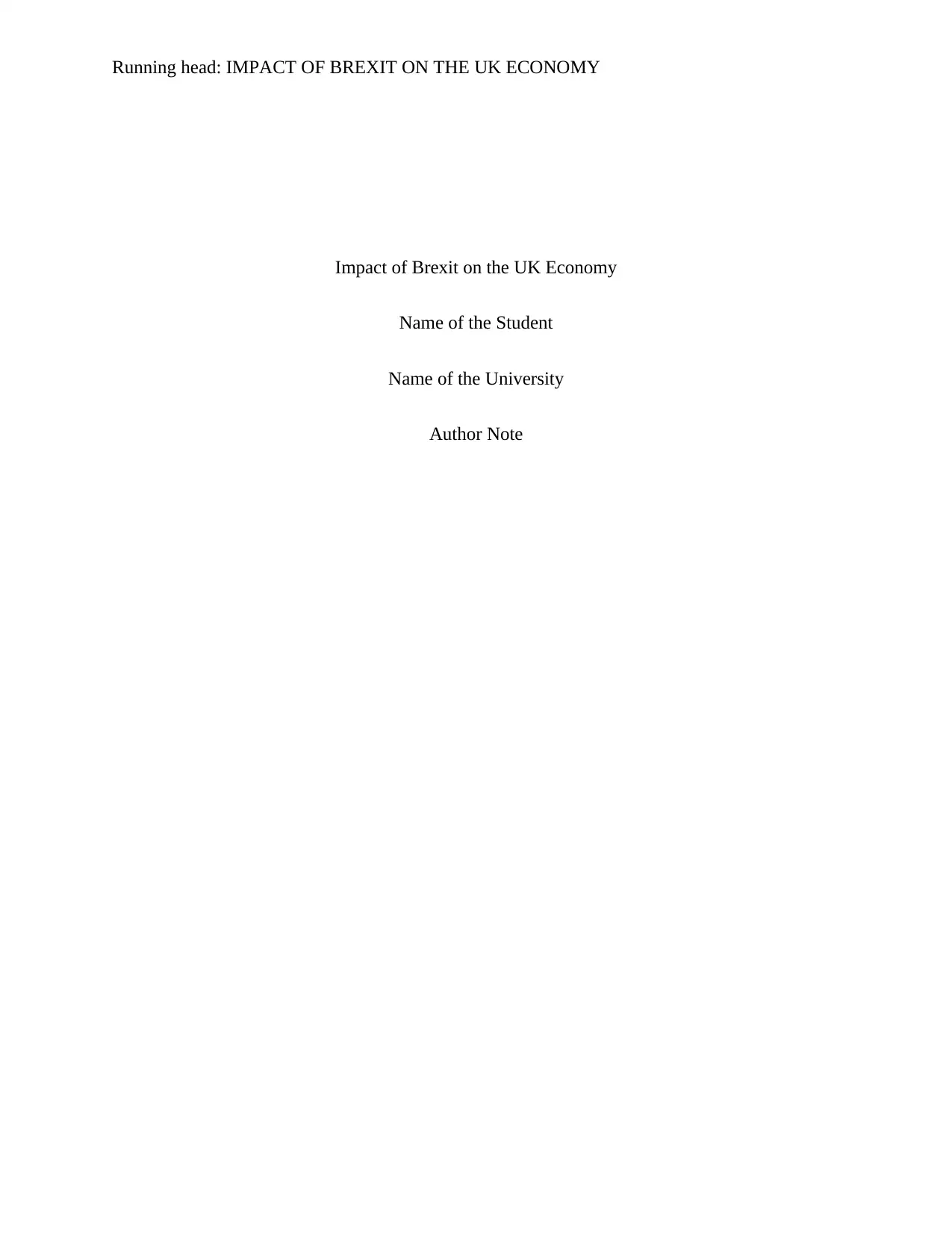
Running head: IMPACT OF BREXIT ON THE UK ECONOMY
Impact of Brexit on the UK Economy
Name of the Student
Name of the University
Author Note
Impact of Brexit on the UK Economy
Name of the Student
Name of the University
Author Note
Paraphrase This Document
Need a fresh take? Get an instant paraphrase of this document with our AI Paraphraser
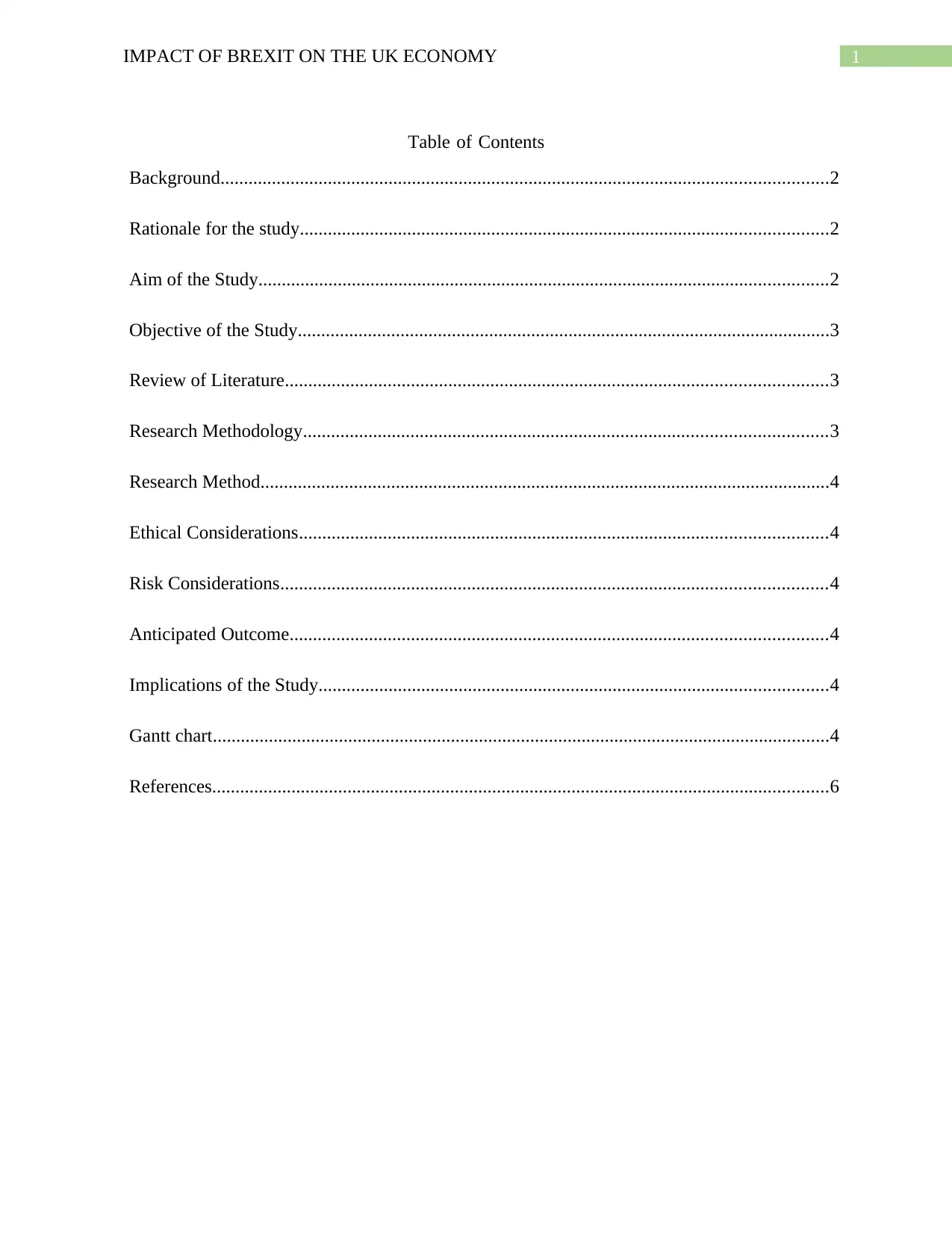
1IMPACT OF BREXIT ON THE UK ECONOMY
Table of Contents
Background..................................................................................................................................2
Rationale for the study.................................................................................................................2
Aim of the Study..........................................................................................................................2
Objective of the Study..................................................................................................................3
Review of Literature....................................................................................................................3
Research Methodology................................................................................................................3
Research Method..........................................................................................................................4
Ethical Considerations.................................................................................................................4
Risk Considerations.....................................................................................................................4
Anticipated Outcome...................................................................................................................4
Implications of the Study.............................................................................................................4
Gantt chart....................................................................................................................................4
References....................................................................................................................................6
Table of Contents
Background..................................................................................................................................2
Rationale for the study.................................................................................................................2
Aim of the Study..........................................................................................................................2
Objective of the Study..................................................................................................................3
Review of Literature....................................................................................................................3
Research Methodology................................................................................................................3
Research Method..........................................................................................................................4
Ethical Considerations.................................................................................................................4
Risk Considerations.....................................................................................................................4
Anticipated Outcome...................................................................................................................4
Implications of the Study.............................................................................................................4
Gantt chart....................................................................................................................................4
References....................................................................................................................................6

2IMPACT OF BREXIT ON THE UK ECONOMY
⊘ This is a preview!⊘
Do you want full access?
Subscribe today to unlock all pages.

Trusted by 1+ million students worldwide
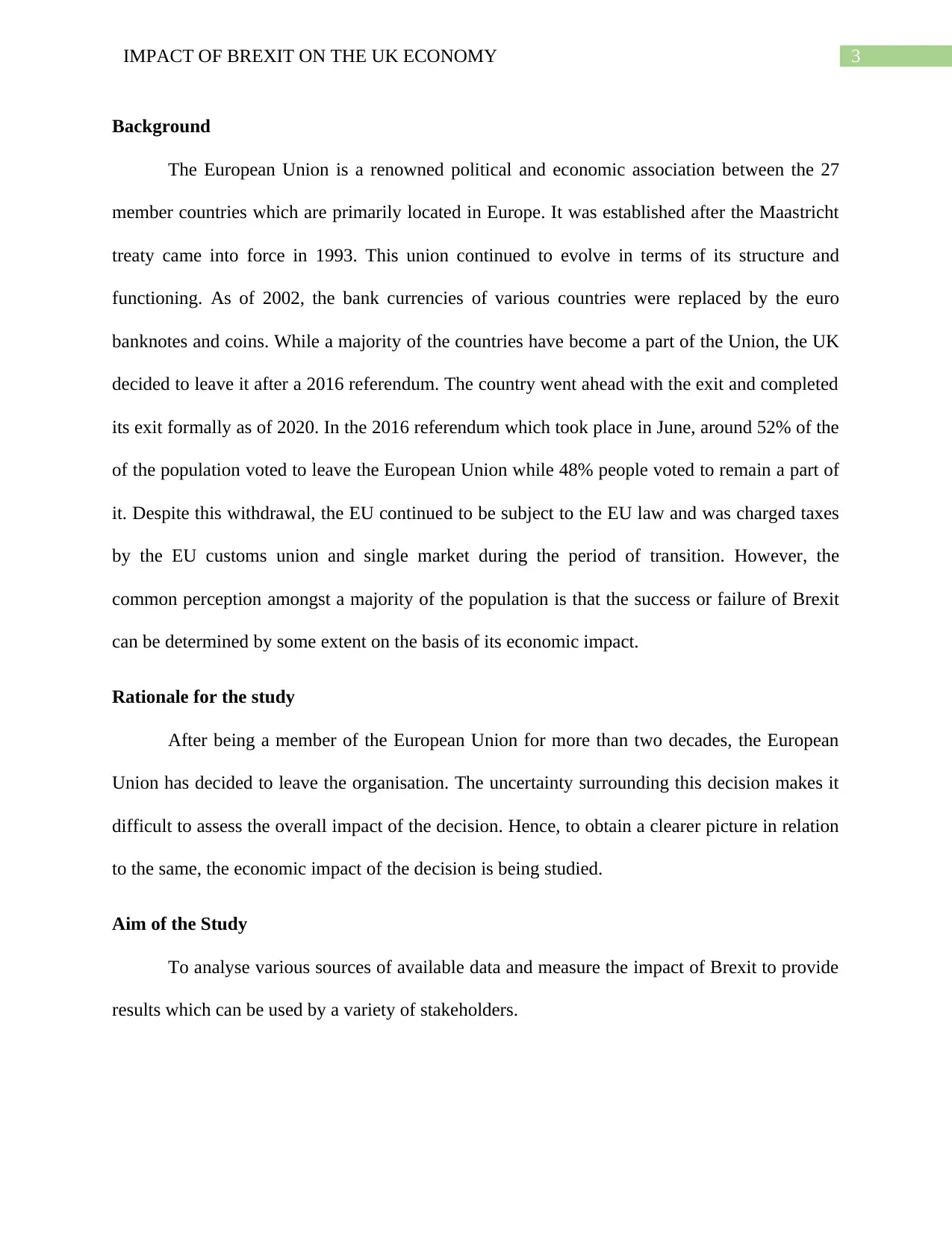
3IMPACT OF BREXIT ON THE UK ECONOMY
Background
The European Union is a renowned political and economic association between the 27
member countries which are primarily located in Europe. It was established after the Maastricht
treaty came into force in 1993. This union continued to evolve in terms of its structure and
functioning. As of 2002, the bank currencies of various countries were replaced by the euro
banknotes and coins. While a majority of the countries have become a part of the Union, the UK
decided to leave it after a 2016 referendum. The country went ahead with the exit and completed
its exit formally as of 2020. In the 2016 referendum which took place in June, around 52% of the
of the population voted to leave the European Union while 48% people voted to remain a part of
it. Despite this withdrawal, the EU continued to be subject to the EU law and was charged taxes
by the EU customs union and single market during the period of transition. However, the
common perception amongst a majority of the population is that the success or failure of Brexit
can be determined by some extent on the basis of its economic impact.
Rationale for the study
After being a member of the European Union for more than two decades, the European
Union has decided to leave the organisation. The uncertainty surrounding this decision makes it
difficult to assess the overall impact of the decision. Hence, to obtain a clearer picture in relation
to the same, the economic impact of the decision is being studied.
Aim of the Study
To analyse various sources of available data and measure the impact of Brexit to provide
results which can be used by a variety of stakeholders.
Background
The European Union is a renowned political and economic association between the 27
member countries which are primarily located in Europe. It was established after the Maastricht
treaty came into force in 1993. This union continued to evolve in terms of its structure and
functioning. As of 2002, the bank currencies of various countries were replaced by the euro
banknotes and coins. While a majority of the countries have become a part of the Union, the UK
decided to leave it after a 2016 referendum. The country went ahead with the exit and completed
its exit formally as of 2020. In the 2016 referendum which took place in June, around 52% of the
of the population voted to leave the European Union while 48% people voted to remain a part of
it. Despite this withdrawal, the EU continued to be subject to the EU law and was charged taxes
by the EU customs union and single market during the period of transition. However, the
common perception amongst a majority of the population is that the success or failure of Brexit
can be determined by some extent on the basis of its economic impact.
Rationale for the study
After being a member of the European Union for more than two decades, the European
Union has decided to leave the organisation. The uncertainty surrounding this decision makes it
difficult to assess the overall impact of the decision. Hence, to obtain a clearer picture in relation
to the same, the economic impact of the decision is being studied.
Aim of the Study
To analyse various sources of available data and measure the impact of Brexit to provide
results which can be used by a variety of stakeholders.
Paraphrase This Document
Need a fresh take? Get an instant paraphrase of this document with our AI Paraphraser
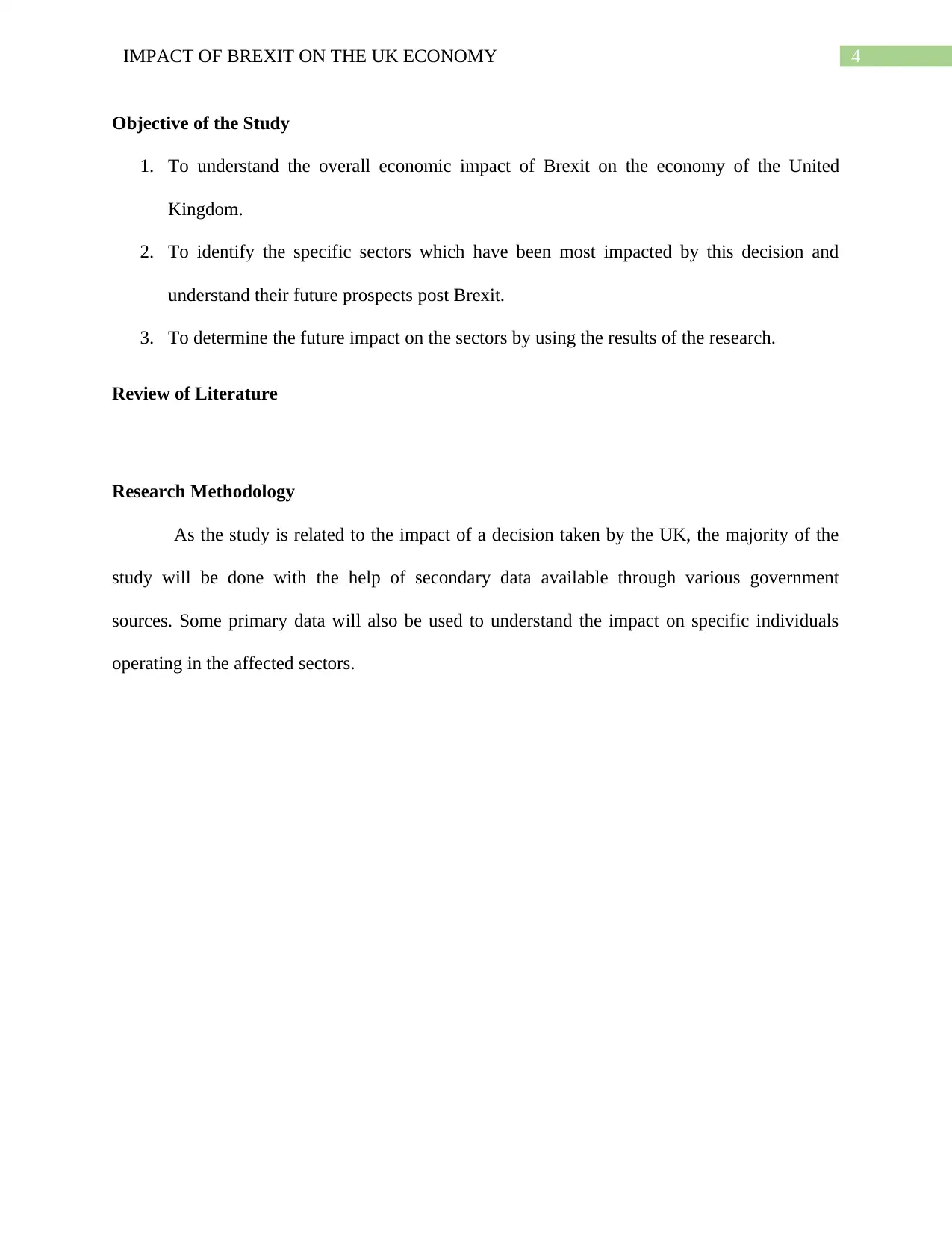
4IMPACT OF BREXIT ON THE UK ECONOMY
Objective of the Study
1. To understand the overall economic impact of Brexit on the economy of the United
Kingdom.
2. To identify the specific sectors which have been most impacted by this decision and
understand their future prospects post Brexit.
3. To determine the future impact on the sectors by using the results of the research.
Review of Literature
Research Methodology
As the study is related to the impact of a decision taken by the UK, the majority of the
study will be done with the help of secondary data available through various government
sources. Some primary data will also be used to understand the impact on specific individuals
operating in the affected sectors.
Objective of the Study
1. To understand the overall economic impact of Brexit on the economy of the United
Kingdom.
2. To identify the specific sectors which have been most impacted by this decision and
understand their future prospects post Brexit.
3. To determine the future impact on the sectors by using the results of the research.
Review of Literature
Research Methodology
As the study is related to the impact of a decision taken by the UK, the majority of the
study will be done with the help of secondary data available through various government
sources. Some primary data will also be used to understand the impact on specific individuals
operating in the affected sectors.
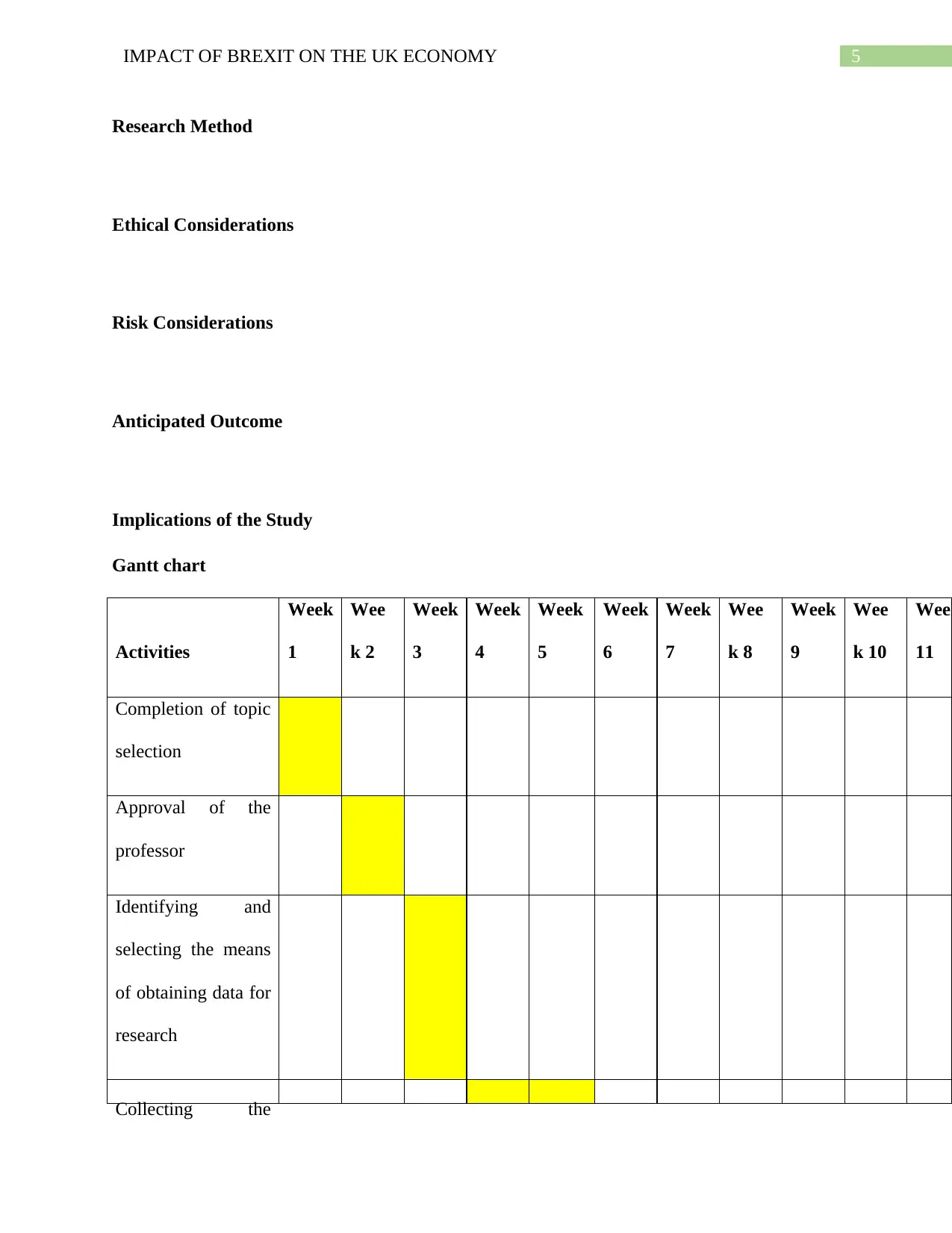
5IMPACT OF BREXIT ON THE UK ECONOMY
Research Method
Ethical Considerations
Risk Considerations
Anticipated Outcome
Implications of the Study
Gantt chart
Activities
Week
1
Wee
k 2
Week
3
Week
4
Week
5
Week
6
Week
7
Wee
k 8
Week
9
Wee
k 10
Week
11
Completion of topic
selection
Approval of the
professor
Identifying and
selecting the means
of obtaining data for
research
Collecting the
Research Method
Ethical Considerations
Risk Considerations
Anticipated Outcome
Implications of the Study
Gantt chart
Activities
Week
1
Wee
k 2
Week
3
Week
4
Week
5
Week
6
Week
7
Wee
k 8
Week
9
Wee
k 10
Week
11
Completion of topic
selection
Approval of the
professor
Identifying and
selecting the means
of obtaining data for
research
Collecting the
⊘ This is a preview!⊘
Do you want full access?
Subscribe today to unlock all pages.

Trusted by 1+ million students worldwide
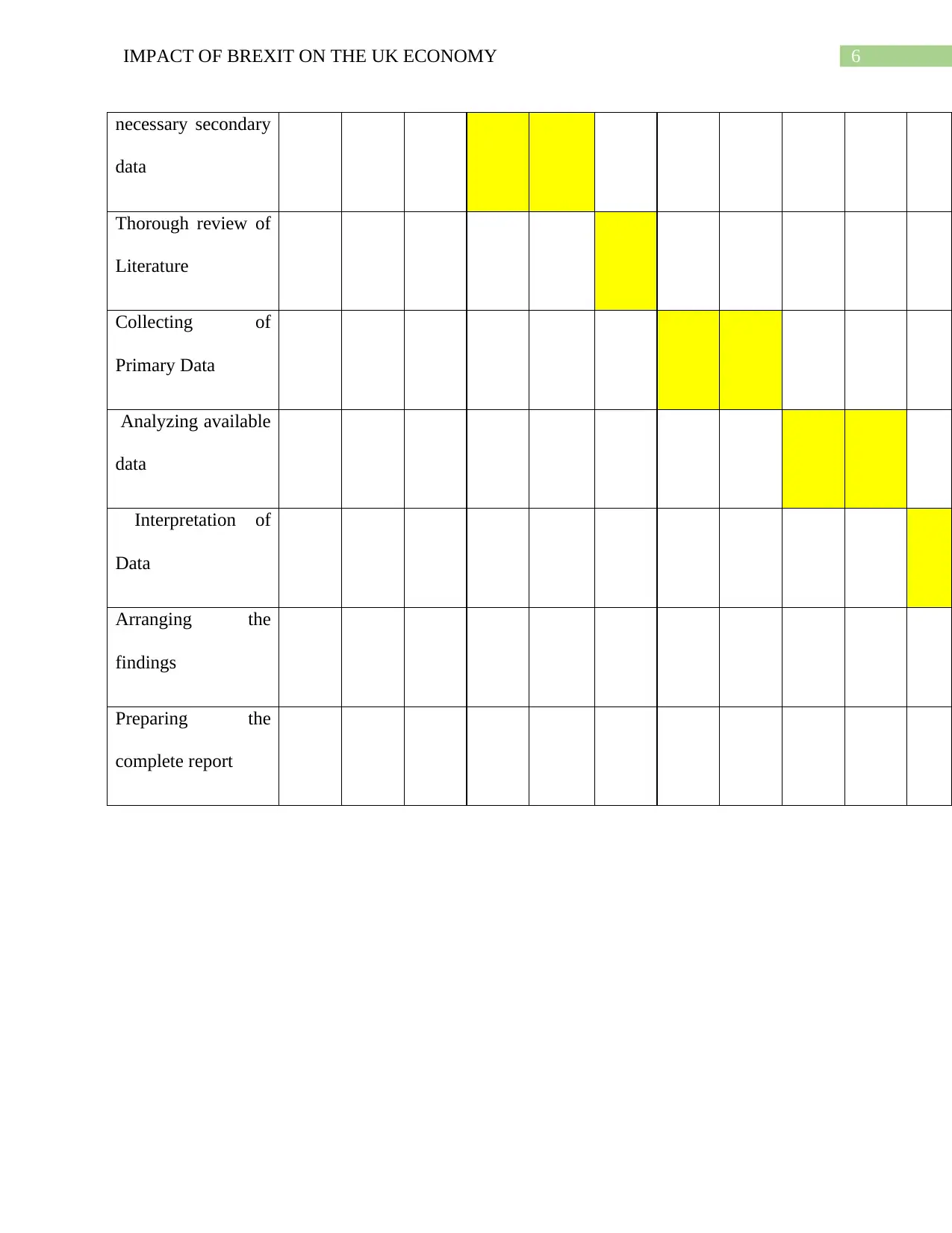
6IMPACT OF BREXIT ON THE UK ECONOMY
necessary secondary
data
Thorough review of
Literature
Collecting of
Primary Data
Analyzing available
data
Interpretation of
Data
Arranging the
findings
Preparing the
complete report
necessary secondary
data
Thorough review of
Literature
Collecting of
Primary Data
Analyzing available
data
Interpretation of
Data
Arranging the
findings
Preparing the
complete report
Paraphrase This Document
Need a fresh take? Get an instant paraphrase of this document with our AI Paraphraser

7IMPACT OF BREXIT ON THE UK ECONOMY
References
References
1 out of 8
Related Documents
Your All-in-One AI-Powered Toolkit for Academic Success.
+13062052269
info@desklib.com
Available 24*7 on WhatsApp / Email
![[object Object]](/_next/static/media/star-bottom.7253800d.svg)
Unlock your academic potential
Copyright © 2020–2026 A2Z Services. All Rights Reserved. Developed and managed by ZUCOL.





